Implementing institution: University of Portsmouth
Country: United Kingdom
Source: Education Endowment Foundation
Execution period: 2013
Plataforma de Prácticas Efectivas:
Supporting schools to improve the expectations and achievements of their students, helping them become resilient, safe and effective students.
A program that stimulates the intelligence and metacognition of students, through work group exercises.
Participating students increase their math and English scores by 0.18 SD; and the impact on the most vulnerable students is even greater (+0.4 SD).
Changing Mindsets is a program that seeks to strengthen the cognitive abilities of students in elementary education to achieve greater performance in mathematics and English. The initiative was developed by Growing Learners, a group of psychologists from the University of Portsmouth who start from the hypothesis that intelligence (or metacognition) is not a fixed characteristic but one that is in constant development (Carol Dweck, 1999). Therefore, teachers have the capacity to influence the intelligence of their students, supporting their efforts and learning processes.
The Changing Mindsets program includes two supplementary components: 6 small working groups with students and teacher training. During working groups, a tutor teaches students the flexible character of intelligence and encourages them to discover it through math exercises and literature. Two of the six sessions are given by a graduate of the University of Portsmouth, while the other four are given by the Education Business Partnership and the Pompey Study Centre (now called Portsmouth in the Community). The second component of the intervention is that teachers are trained for half a day in metacognition. This way, the key concepts of the aforementioned hypothesis are disseminated, as well as the practical tools to adapt their pedagogy and generate an environment conducive to the development of students’ intelligence.
In England, the enrolment of children at elementary and secondary levels covers almost the entire population of attendance age (99.85% and 98.28% respectively by 2014). Net participation rates have been growing since 2006, especially at the secondary level (+6 percentage points). However, the OECD’s International Programme for Student Assessment Report, or PISA Report, has highlighted a decline in reading literacy levels among the 15-year-old English population since 2011.
The Changing Mindsets program was evaluated between January and May 2013 by the National Institute for Economic and Social Research with funding from the Education Endowment Foundation. The study aimed to identify the impacts of the methodology on students’ abilities in mathematics and English. To this end, an experimental test was carried out with a sample of 286 students for the working groups and a sample of 1,505 to measure the effect of teacher training. Each sample was divided into a control group and an intervention group. All students passed a standardized aptitude test before beginning the study, just after finishing, and then 10 months after the closing date. The comparison of the results among the different groups has shown an overall impact of the Changing mindset program of +0.18 SD in both mathematics and English. The impact on the most financially vulnerable students is even greater (+0.4). However, none of the results mentioned were statistically significant. The evaluation team then recommends re-evaluating the program with its two components over a longer period of time. Intervention costs reach £397 per student per year.
Impact of intervention:

Charts: Impact measured in standard deviations of the intervention group compared to the control group.
Link: http://www.port.ac.uk/department-of-psychology/community-collaboration/changing-mindsets/
Report: Ver informe
Other documents: Cambiando-mentalidades-1.pngUoPormouth-e1494201398191.gif
Tags: